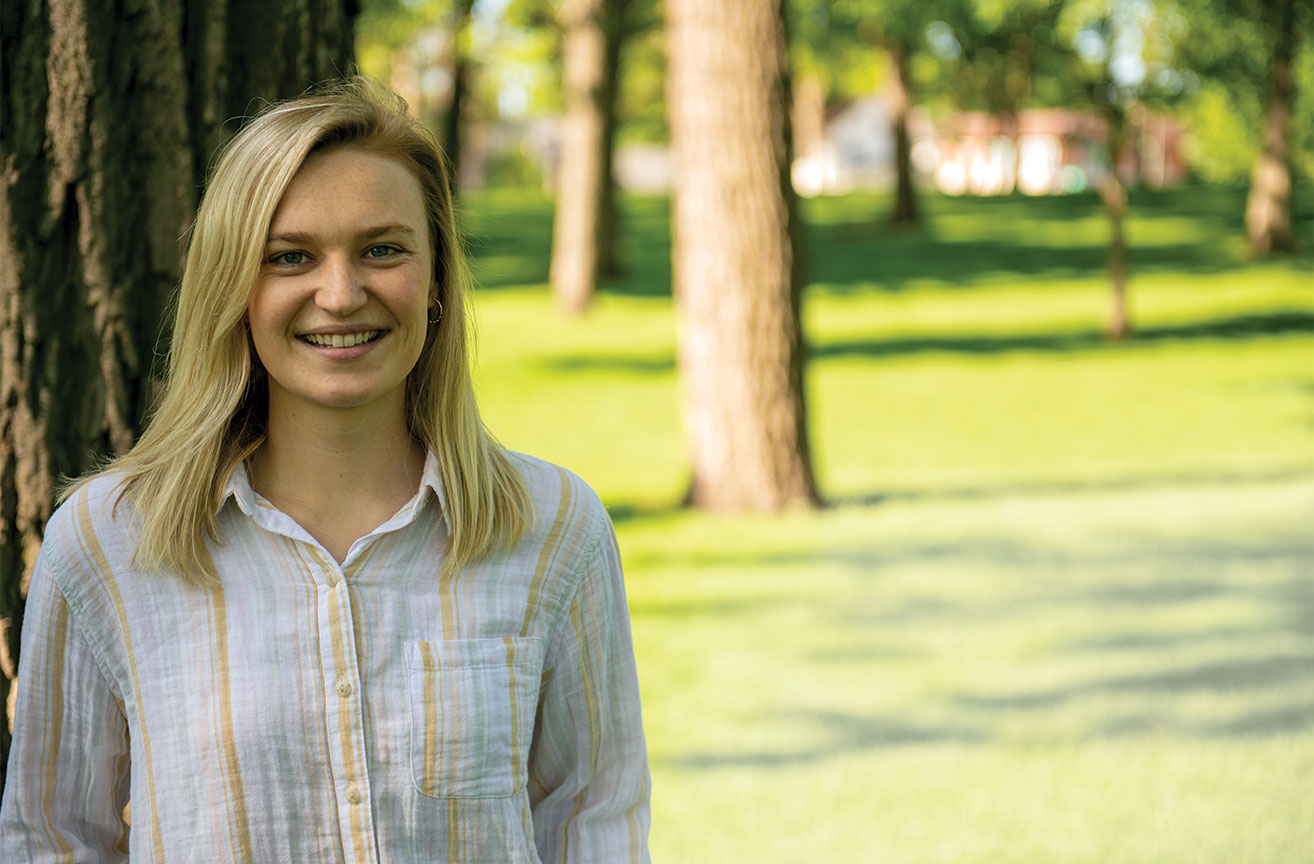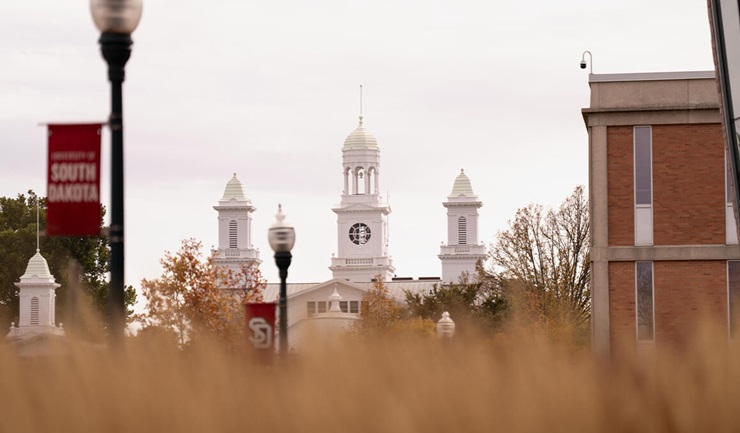FARM: Maria Koenen Finds Home Away from Home in Parkston

The Pillar 2 Sanford School of Medicine student had completed her undergraduate education just 22 miles north of Parkston in Mitchell, at Dakota Wesleyan University. She was familiar with the area and knew some people nearby. With her selection into the SSOM Parkston FARM program, Koenen would be reunited with the area and afforded the unique and notable opportunity to immerse herself in one of South Dakota’s most comprehensive rural care and training environments.
In the small farming community in southeast South Dakota, where its medical center, Avera St. Benedict Hospital, is an active hub for health care and employment for miles in all directions, those assets cannot be overstated. Area residents rely on St. Benedict’s services for overall physical, social and mental health issues and disease prevention.
A community of 1,500, Parkston was one of the initial locations selected by the SSOM in 2014 because of the impressive critical access, 25-bed hospital and clinic that employs 200. Avera St. Benedict is a comprehensive, integrative facility that serves its community well, Rita Blasius, the facility’s CEO, says. “As you look around the region, in a community the size of ours, to have four full-time family practice physicians is almost unheard of. We are able to provide services to our patients with a very high level professional staff, with many visiting specialists in orthopedics, oncology, ENT, surgery, urology, podiatry, cardiology and pulmonology. We have highly-trained staff in nursing, labs and radiology as well as CRNAs, OB-GYN capabilities, a trauma response team and critical care.”
Since its implementation in 2014, the Sanford School of Medicine’s FARM program has strengthened in number and reputation. It has grown from five initial locations to seven, with a handful of locations now accepting two medical students. Currently, FARM sites include Parkston, Milbank, Mobridge, Winner, Pierre, Spearfish and Vermillion.
Each FARM location must meet requirements for consideration, such as the ability to meet student requirements of Pillar 2, a surgical presence, obstetrical services, sufficient clinical resources, a good community infrastructure, intentional collaboration with all involved, and demonstrated buy-in from key community and hospital stakeholders.
St. Benedict’s broad footprint reaches thousands of patients. Outreach clinics in Wagner, Tripp, Armour, Corsica and Lake Andes draw patients from 60 miles away or more. Physicians make nursing home visits, provide some services in Scotland and conduct treatment plans at Our Home residential treatment home for adolescents. A liaison nurse visits eight nearby Hutterite colonies.
“There’s a high level of care here,” explains Blasius. “We’ve worked hard to provide all we can so people can receive this care close to home and to provide diverse employment opportunities to our residents.”
That level of care is one reason why Koenen was excited to spend nearly a calendar year during medical school engaged with that community, to gain experience with rural health—experience she’ll utilize every day of her medical career, regardless of what specialty she winds up in.
With a rural upbringing herself, growing up on a farm in Rock Valley, Iowa, Koenen obtained a degree in athletic training and biochemistry from Dakota Wesleyan. She is currently in her fourth year at SSOM and will graduate next May.
"Being a farm kid, I like smaller towns. It’s how I grew up,” she says. “I have a vested interest in rural health care. With the FARM program, I saw a great opportunity to get involved and I was intrigued by the hands-on experience and well-rounded view of medicine in general all in one location."
Dr. Jason Wickersham, a 2001 graduate of the Sanford School of Medicine, has spent his career in rural medicine, employed with Avera St. Benedict nearly 18 years, arriving in Parkston after his residency at Clarkson Family Medicine in Omaha. According to Dr. Wickersham, SSOM students in FARM are well prepared to enter residency and fellowship, making for an easy transition to hands-on procedures at the hospital.
“These FARM students are very prepared to work in our hospital,” he says. “They are very motivated, self-learners, eager to be here and to help and learn everything we do. We care for the entire life cycle from OB to end-of-life and everything in between. Any procedure they have an interest in, they get to perform, and they get experience in the nursing home, ER and clinic.”
For many years, Parkston has fully supported medical education and it shows.
“The doctors at Avera St. Benedict were very invested in my education,” shares Koenen. “There was a high level of investment on all fronts. As a FARM student, I had to be an independent learner, studying for boards on my own time. My mentors encouraged me to take my experiences in the clinic and use those to study at home.
“My time in Parkston helped shape me into the physician I wanted to be when I started medical school,” Koenen continues. “I was able to learn and grow in a really supportive environment with a ton of opportunity for growth in skills. I’m capable of so much now because of the autonomy and teaching I got there.”
For Koenen, some added benefits to her experience at St. Benedict were the provided housing and meals at the hospital, as well as an incredible support system and avenues to immerse herself in the community. St. Benedict made it easy to make friends, she says.
Her connections enabled her to get involved in athletic events at Parkston High School, putting her athletic training skillset to use. She gave talks on concussions to parents of athletes and the ambulance association. She even participated in donkey basketball—which is exactly as it sounds; basketball played while riding donkeys—for a HOSA fundraiser and volunteered at the community’s Fourth of July celebration at the EMS tent.
Her time spent educating and offering support on the sidelines contributed toward her community outreach project, a requirement of the FARM program, for which she consequently received the “Outstanding Community Project” award sponsored by the South Dakota Academy of Family Physicians.
“Students find spending time here to be a valuable experience and feel they get a great education,” says Dr. Wickersham. “Some are surprised about everything that happens in a rural facility. We want FARM students to go back to their colleagues and say Parkston is a great place to work.”
St. Benedict administrators find rewards in hosting the FARM students and giving back to a profession that has brought benefits to their facility. “There is ongoing hope that our encouragement and education feed the next generation of providers,” Blasius says. “When we have students here, of any kind—we’ve been a part of lots of programs—they teach us too. We are able to keep up to speed with technology, practices and procedures. We love establishing relationships with these young folks.”
“We’d love to recruit a FARM student back to work with us after they graduate, but even if that doesn’t happen, they help spread the word to colleagues that rural medicine is vibrant and up-to-date,” agrees Dr. Wickersham. “Many of these students will go on to be specialists and they can help others understand that rural medicine is happening in good places. It may help to change what is sometimes a negative connotation of rural medicine.”
Although her FARM experience is completed, Koenen still frequently visits Parkston. “I’ve been back a lot for different things; it became my home.”
As Blasius puts it, “Relationships are the crux of it all.
“As a rural hospital, we are extremely proud of the relationship we have with the Sanford School of Medicine,” says Blasius. “Everyone on our administrative medical staff has some connection to the med school. Everyone shares the underlying goal of making sure that we have physicians to serve our state, region and area. We are most proud to have this collaborative working relationship—we’ve had it a long time, even before FARM. There are no silos, and we know well the people we are working with at SSOM. We are fortunate to live in this part of the country and in a state where rural medicine is a focus and a priority.”
Koenen says perhaps her favorite thing about her FARM experience was the inclusion she felt. “Sometimes, as a med student you can feel a little bit in the way, but one of the neatest things about my experience at St. Benedict is that I felt like a member of the team and that I was useful, like I was contributing to the big picture. I loved how much autonomy I was given to apply hands-on skills.”
Family medicine physician Dr. Paul Berndt was another important influence for Koenen at St. Benedict. “He is incredible with patients,” she said. “I learned compassion, kindness, how to talk to patients. And I was always impressed with the nurses, their investment in their education. They’re always helping.”
Koenen relays an occasion when she was called in for a procedure in the emergency room, even though she was not on call. “Dr. Berndt called me in to do a suturing procedure in the emergency room, since there were two patients there at the same time. I wasn’t even on call, but he knew how much I love to do sutures, so he called me in. I appreciated that.”
As of now, Koenen says she’d like to specialize in general surgery as she moves her medical career forward. Although she initially thought she’d end up practicing in a big city, her FARM experience persuaded her to pursue practice as a rural general surgeon. “I would love to work in Mitchell and do outreach in Parkston,” she says. “I would love to come back and work with them again.
“It was very hard to move away from there. My experience was so incredible.”






